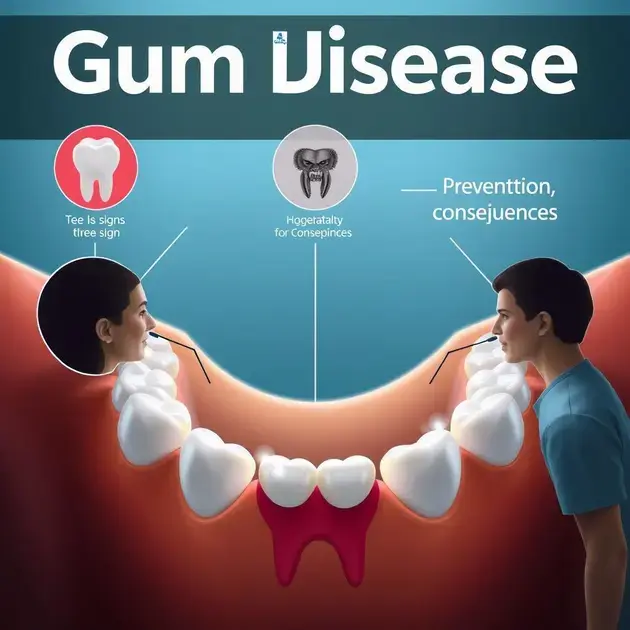Gum disease, often silent until it becomes serious, can progress quietly in your mouth without noticeable discomfort. Recognizing the signs of gum disease is essential for early intervention and prevention of more severe health issues. Signs include swollen, red, or bleeding gums, bad breath that doesn’t go away, and loose teeth. Understanding these symptoms early can lead you to seek timely dental care, which is crucial for maintaining overall oral health.
Recent studies underscore the pervasive nature of gum disease, revealing that it affects millions of adults globally. It’s not just an oral health issue; research has linked gum disease to broader systemic health issues, including heart disease, diabetes, and stroke. This serves as a strong wake-up call to take the signs of gum disease seriously and act promptly. Regular check-ups and adopting a comprehensive oral hygiene routine can play a pivotal role in prevention and management.

Common Signs of Gum Disease
Gum disease, also known as periodontal disease, is a common condition that can have serious implications for your oral health if left untreated. Recognizing the signs of gum disease early on is crucial for prompt intervention and effective treatment. Here are some common signs to look out for:
Bleeding Gums
One of the early signs of gum disease is bleeding gums, especially when brushing or flossing. If you notice blood in the sink after brushing your teeth, it could be a sign of inflammation in the gums.
Swollen Gums
Swollen or tender gums can also indicate the presence of gum disease. If your gums are red, puffy, or sensitive to the touch, it’s important to consult with a dentist for further evaluation.
Bad Breath
Chronic bad breath, also known as halitosis, can be a sign of gum disease. Bacteria that accumulate in the pockets between the teeth and gums can cause persistent odors that mouthwash alone cannot eliminate.
Receding Gums
Receding gums, where the gum tissue pulls back from the teeth, exposing more of the tooth’s root, can be a sign of advanced gum disease. This condition can lead to tooth sensitivity and even tooth loss if not addressed promptly.
Loose or Shifting Teeth
As gum disease progresses, it can affect the supporting bone structure around the teeth, leading to loose or shifting teeth. If you notice changes in the alignment of your teeth, it’s important to seek dental care as soon as possible.
Early Detection for Prompt Intervention
Early detection of gum disease is key to preventing its progression and minimizing potential complications. By following these steps, you can detect gum disease early and seek prompt intervention:
Regular Dental Check-ups
Schedule regular dental check-ups with a qualified dentist who can assess your oral health and detect early signs of gum disease. Websites like ZoomTrend can provide information on finding a reputable dentist in your area.
Maintain Good Oral Hygiene
Brushing and flossing your teeth regularly can help prevent the buildup of plaque and tartar, which are major contributors to gum disease. Make sure to follow proper oral hygiene practices recommended by dental professionals.
Monitor Changes in Your Oral Health
Be vigilant about any changes in your gums, such as bleeding, swelling, or recession. If you notice any unusual symptoms, don’t hesitate to seek advice from a dental professional for early intervention.
Healthy Lifestyle Choices
Adopting a healthy lifestyle that includes a balanced diet and avoiding tobacco products can contribute to better oral health and reduce the risk of gum disease. Websites like ZoomTrend can provide resources on maintaining a healthy lifestyle.
Regular Cleanings and Treatments
Professional cleanings and treatments from a dental hygienist or dentist can help remove plaque and tartar buildup that regular brushing alone may not address. Stay consistent with your dental appointments for ongoing preventive care.
The Link Between Gum Disease and Overall Health
Research has shown that gum disease is not just a localized oral health issue but can also impact your overall well-being. Understanding the link between gum disease and overall health is essential for holistic healthcare. Here’s how gum disease can affect your overall health:
Heart Disease
Studies have found a connection between gum disease and heart disease, with inflammation in the gums contributing to cardiovascular issues. Maintaining gum health can help reduce the risk of heart-related complications.
Diabetes
Gum disease can make it harder to control blood sugar levels in individuals with diabetes, leading to potential complications. Managing oral health through regular dental visits can support better diabetes management.
Respiratory Problems
Bacteria from gum disease can be inhaled into the lungs, potentially leading to respiratory infections or exacerbating existing respiratory conditions. By treating gum disease, you can help protect your respiratory health.
Pregnancy Complications
Pregnant women with untreated gum disease may be at higher risk of complications such as preterm birth or low birth weight. Maintaining oral health during pregnancy is crucial for both maternal and infant well-being.
Immune System Function
Chronic inflammation from gum disease can weaken the immune system, making the body more susceptible to infections and diseases. By addressing gum health, you can support overall immune function and reduce the risk of systemic health issues.

Identifying Symptoms of Gum Disease
Gum disease, also known as periodontal disease, is a common condition that affects the gums and can lead to serious oral health issues if left untreated. It’s important to be able to recognize the symptoms of gum disease early on so that you can seek treatment promptly. Some common symptoms of gum disease include:
- Bleeding gums when brushing or flossing
- Swollen or tender gums
- Receding gums
- Persistent bad breath
- Pus between the teeth and gums
Steps to identify symptoms of gum disease:
- Regularly inspect your gums for any signs of redness, swelling, or bleeding.
- Pay attention to any changes in the appearance or sensitivity of your gums.
- Consult with your dentist if you experience any of the symptoms mentioned above.
- Undergo routine dental check-ups to detect gum disease in its early stages.
- Maintain good oral hygiene practices to prevent gum disease from developing.
Best Practices for Preventing Gum Disease
Preventing gum disease is essential for maintaining optimal oral health and avoiding more serious dental issues in the future. By following some simple best practices, you can reduce your risk of developing gum disease. Some effective ways to prevent gum disease include:
- Brushing your teeth at least twice a day with fluoride toothpaste
- Flossing daily to remove plaque and food particles between your teeth
- Eating a balanced diet rich in fruits and vegetables
- Avoiding tobacco products, as they can increase the risk of gum disease
- Scheduling regular dental cleanings and check-ups
Steps for preventing gum disease:
- Establish a consistent oral hygiene routine that includes brushing, flossing, and rinsing with mouthwash.
- Avoid sugary and acidic foods that can contribute to plaque build-up and gum inflammation.
- Stay hydrated and drink plenty of water to promote overall oral health.
- Avoid smoking and limit alcohol consumption to protect your gums and teeth.
- Visit your dentist regularly for professional cleanings and assessments of your gum health
Understanding the Impact of Gum Disease on Oral Health
Gum disease can have a significant impact on your overall oral health, affecting not only your gums but also your teeth and surrounding tissues. If left untreated, gum disease can lead to serious complications, including tooth loss and bone damage. Understanding the consequences of gum disease is crucial for taking proactive steps to protect your oral health. Some potential impacts of gum disease include:
- Gum recession, leading to exposed tooth roots
- Bone loss in the jaw, weakening the support for teeth
- Tooth decay and eventual tooth loss
- Increased risk of systemic health issues, such as heart disease
- Chronic inflammation and discomfort in the oral cavity
Steps to comprehend the impact of gum disease on oral health:
- Educate yourself on the stages of gum disease and how it progresses if untreated.
- Discuss any concerns or symptoms with your dentist to address gum disease early on.
- Follow recommended treatment plans to manage and reverse the effects of gum disease.
- Commit to long-term oral hygiene practices to prevent recurrence of gum disease.
- Stay informed about the latest research and advancements in gum disease prevention and treatment.
Conclusion
In conclusion, recognizing the symptoms of gum disease early on is crucial for prompt treatment and maintaining optimal oral health. Symptoms such as bleeding gums, swelling, bad breath, and receding gums should not be ignored, and regular dental check-ups are essential for early detection.
Prevention of gum disease is key to preserving your oral health and preventing more serious complications in the future. By following best practices like daily brushing and flossing, maintaining a balanced diet, and avoiding tobacco products, you can significantly reduce your risk of developing gum disease.
Understanding the impact of gum disease on oral health is vital in taking proactive measures to protect your gums, teeth, and overall well-being. Complications such as gum recession, bone loss, tooth decay, and systemic health issues underscore the importance of education, regular dental visits, and adherence to treatment plans.
